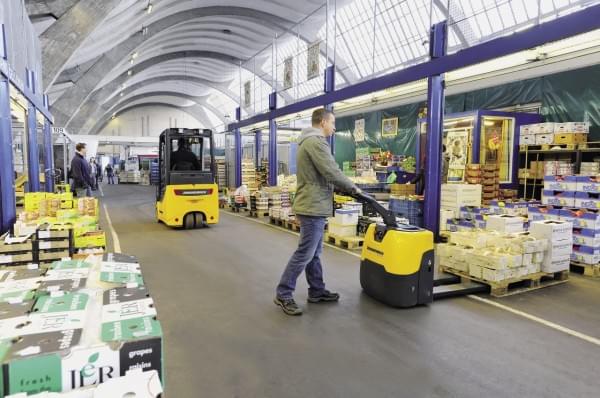Packaging materials in circulation
Mária Gergely, a representative of the European Pallet Association’s (EPAL) Hungarian office told our magazine that the organisation has 1,600 members all over the world. In 2014 66.3 million pallets were manufactured with the EPAL/EPAL marking and altogether 300 million of these are used worldwide.
By manufacturing them locally EPAL pallets become affordable and economical for companies. They are also an excellent choice for environmentally conscious firms: unlike plastic ones, these wooden pallets can be recycled. Ferenc Polgár, managing director of P&P Budafok Kft. emphasised to us that his company’s mission is to cut down on its waste production. The best way to do it is recycling, so they mainly manufacture pallets from recycled raw material, but they also make crates and various boards. Recycling requires lots of work, from collecting damaged pallets, selecting and dismantling them to turning them into new products. For this process special tools need to be used. All in all, we can say that this is a rather costly process and the administrative burden is also growing. According to Zoltán Horváth, managing director of Jungheinrich Hungária Kft. with the development of the automotive industry in Hungary new market opportunities have been created for the sector, including material handling machinery manufacturers. Electric forklift trucks and warehouse technology machinery are the most popular products. Jungheinrich’s material handling machines are characterised by high handling capacity and low energy consumption, plus they come with full scale maintenance. Hedvig Mattyasovszky, sales director of Metsä Board Magyarország is of the opinion that sustainability is becoming important for a growing number of branded good manufacturers. Metsä Board reacted to this trend early, investing in research and development to come out with high-capacity packaging solutions. The company is Europe’s leading folding boxboard (FBB) manufacturer and is one of the pioneers of lightweighting. All Metsä Board paperboards are made using fibres from renewable northern wood. Orsolya Bajusz, sales manager of Schoeller Allibert Kft. told Trade magazine that they manufacture reusable plastic packaging. They supply various fields of the food industry, from fruit and vegetable producers to retailers. Their distribution crates, hygienic pallets, foldable crates and containers are the most popular. On demand the company also develops products customised to partner needs, and they offer complex, ‘from production line to the shelves’-type packaging solutions as well. From Tetra Pak Jenő Kampós talked to our magazine. She told that they provide partners with technological solutions used both in the packaging and food processing industries – these solutions come with a maintenance service. All over the world consumers show growing demand for convenience products, which have to be healthy and comfortable to use, e.g. ergonomic, resealable, etc. Tetra Brik® Aseptic is one of partners’ favourite solutions; this product is manufactured in Budaörs with PLH caps.
Related news
Related news
KSH: retail turnover in January exceeded the same period of the previous year by 3.5 percent and the previous month by 0.5 percent
🎧 Hallgasd a cikket: Lejátszás Szünet Folytatás Leállítás Nyelv: Auto…
Read more >Shape the future, in other words: build a brand!
🎧 Hallgasd a cikket: Lejátszás Szünet Folytatás Leállítás Nyelv: Auto…
Read more >Spring brought an increase in the price of business invoices
🎧 Hallgasd a cikket: Lejátszás Szünet Folytatás Leállítás Nyelv: Auto…
Read more >







